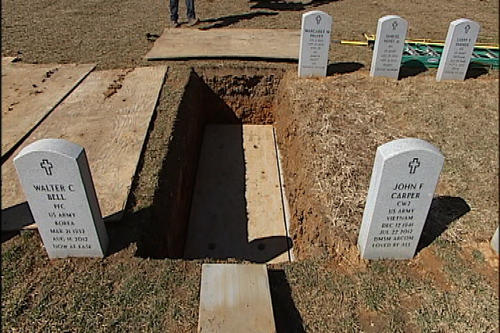Veterans’ Vault Is Full Of Water, Concerns Are Raised About How Families Are Treated At Veteran Cemeteries [Part 1]
Most families don’t know what a burial vault is and even less have any idea the difference between a grave liner and a burial vault.
So if a family visits a Veterans’ cemetery and are told the vault is included with the government issued grave space then how are they suppose to know that it is really a crypt that is government issued and not a ‘burial vault’?
The Veterans Administration, as a rule, nationwide, does not provide vaults for veterans burials. Rather, at no cost, it offers liners, sometimes called a concrete box.
What’s the difference? A liner, which looks like a vault, has no seal, leaving the body inside the casket, exposed. A vault though, has an actual seal that locks and keeps outside elements away from the casket.
Videos are shown to families everyday at funeral homes, explaining the difference between burial containers and sealed vaults, as they decide whether to place the casket in a liner or a vault.
Wilbert Funeral Services and Trigard, the two largest burial vault manufacturers, offer professional training tools and videos to enable funeral directors to properly educate families about what a burial vault is and why one is needed.
Most vault manufacturers offer warranties on their lined and sealed burial vaults. Some are 15 years, 25 years and beyond.
Why aren’t families being told about these options when visiting the cemetery? If the cemetery is their first stop (before meeting with a funeral director) and the cemetery is including a ‘vault’ with their grave space, shouldn’t they be explaining the difference between a vault and a grave liner or crypt?
Watch the report below from WBDJ 7 in Virgina as they speak with the widow of Veteran David Runyon who have been buried in the Southwest Virginia Veterans Cemetery for 18 months. Notice what she says she would have done if she had been told her husband was being buried in a crypt not a vault.





